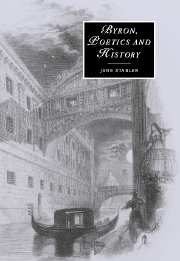Book contents
- Frontmatter
- Contents
- Acknowledgements
- Note on texts
- Abbreviations
- Introduction: Byron and the poetics of digression
- 1 ‘Scorching and drenching’: discourses of digression among Byron's readers
- 2 ‘Breaches in transition’: eighteenth-century digressions and Byron's early verse
- 3 Erring with Pope: Hints from Horace and the trouble with decency
- 4 Uncertain blisses: Don Juan, digressive intertextuality and the risks of reception
- 5 ‘The worst of sinning’: Don Juan, moral England and feminine caprice
- 6 ‘Between carelessness and trouble’: Byron's last digressions
- Notes
- Bibliography
- Index
2 - ‘Breaches in transition’: eighteenth-century digressions and Byron's early verse
Published online by Cambridge University Press: 22 September 2009
- Frontmatter
- Contents
- Acknowledgements
- Note on texts
- Abbreviations
- Introduction: Byron and the poetics of digression
- 1 ‘Scorching and drenching’: discourses of digression among Byron's readers
- 2 ‘Breaches in transition’: eighteenth-century digressions and Byron's early verse
- 3 Erring with Pope: Hints from Horace and the trouble with decency
- 4 Uncertain blisses: Don Juan, digressive intertextuality and the risks of reception
- 5 ‘The worst of sinning’: Don Juan, moral England and feminine caprice
- 6 ‘Between carelessness and trouble’: Byron's last digressions
- Notes
- Bibliography
- Index
Summary
Seventeenth-century scientific empiricism was famously hostile to ‘all the amplifications, digressions, and swellings of style’ which the Royal Society of London condemned as resulting in ‘only mists and uncertainties’. By the first decades of the eighteenth century, however, positive appraisals of digressions were appearing in rhetorical theory. Shaftesbury described a style of ‘deviations and excursions’ as the prerogative of the gentleman and poet in his Characteristicks (1711), and Longinian theory offered another way of reading abrupt change or discontinuity in poetry as the product of sublime inspiration. But the art of digression remained controversial, often highlighting an insecurity in literary criticism more generally. Alexander Pope used digressive footnotes in The Dunciad (1729) to parody the academic scholarship of Lewis Theobald. This technique anticipated the anti-Jacobin satire of Gifford, Canning, Frere and Mathias in the 1790s. All these writers, however, used digression to support the concept of ideal beauty: even the labyrinthine gothic library of The Dunciad shadows the orderly classical edifice of all civilised knowledge.
In eighteenth-century critical discourse, digression was presented as structural beauty, an integral part, whereby the poet temporarily departed from a poem's ostensible subject, but discovered in the process of digressing a hidden connection with the main subject. Digression was, therefore, a way of reinforcing a concept of the unified whole: like the operation of divinity it moved in a mysterious way. Anna Barbauld summarised this digressive decorum in her preface to Akenside's The Pleasures of Imagination:
Many of these pieces … owe all their entertainment to the frequent digressions. Where these arise naturally out of the subject … they are not only allowable but graceful; but if forced, … they can be considered in no other light than that of beautiful monsters, and injure the piece they are meant to adorn.
- Type
- Chapter
- Information
- Byron, Poetics and History , pp. 43 - 72Publisher: Cambridge University PressPrint publication year: 2002



